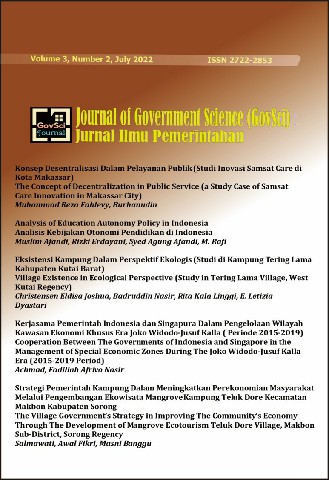Analisis kebijakan otonomi pendidikan di Indonesia Analysis of Education Autonomy Policy in Indonesia
Abstract
This study aims to analyze the autonomy policy of education in Indonesia. This study uses a qualitative approach with library research techniques. The results of this study indicate that the increase in the education budget allocation has not been able to increase the competitiveness of national education in the global arena. The implementation of educational autonomy through the establishment of various policies, including school-based management and the independent campus policy aims to give authority to educational institutions to provide flexibility in the management of education. Although the education autonomy policy has been able to increase the national education participation rate, this policy also raises new problems such as policy conflicts between the central government, regional governments, and educational institutions, inefficiency in education management, the occurrence of new corrupt practices, and education policies that tend to be top-down. The conclusion is that although it is in line with the demands of reform, education autonomy in Indonesia does not necessarily improve the quality of national education.
References
Afandi, M., & Zuraidah. (2020). Kesiapan, Gaya Belajar dan Keaktifan Siswa Pada Pembelajaran Pendidikan Agama Islam di SMPN Bangkinang Kota. Belajea: Jurnal Pendidikan Islam, 5(2).
Afandi, S. A., & Anwar, K. (2017). Governability Implementasi Manajemen Berbasis Sekolah Di Sekolah Dasar Negeri 18 Pekanbaru Tahun 2013-2015. Jurnal Online Mahasiswa Fakultas Ilmu Sosial Dan Ilmu Politik Universitas Riau, 4(1).
Ahmad, S. (2014). Problematika Kurikulum 2013 dan Kepemimpinan Instruksional Kepala Sekolah. Jurnal Pencerahan, 8(2).
Amtu, O. (2011). Manajemen Pendidikan di Era Otonomi Daerah, Konsep, Strategi dan Implementasi. Bandung: Alfabeta.
Arifin, I. (2002). Strategi dan Implementasi Desentralisasi Pendidikan di Sekolah Dasar (Studi Kasus MI Jenderal Sudirman Malang). Malang: Dinas Pendidikan Kota Malang.
Astuti, S. I. (2011). Desentralisasi dan Partisipasi Masyarakat dalam Pendidikan. Yogyakarta: Pustaka Pelajar.
Bappenas. (2020). Perkembangan Ekonomi Indonesia dan Dunia. Jakarta: Bappenas.
Dwiningrum. (2011). Desentralisasi dan Partisipasi Masyarakat dalam Pendidikan. Yogyakarta: Pustaka Pelajar.
Freire, P. (2008). Pendidikan Kaum Tertindas. Jakarta: LP3ES.
Hadiyanto. (2014). Evaluasi Kebijakan dan Program Manajemen Berbasis Sekolah. Prosiding Musyawarah Kerja Apmapi Dan Temu Ilmiah Nasional Manajemen Pendidikan, 1(1).
Husnidar, Afandi, M., & Darwis, A. (2020). Pengaruh Supervisi dan Kepemimpinan Kepala Madrasah terhadap Kepuasan Kerja Tenaga Pendidik Madrasah Tsanawiyah se Kecamatan Perhentian Raja. Indonesian Journal of Islamic Educational Management, 3(1).
Julia, & Afandi, M. (2020). Efektivitas Teknik Mind Mapping Dalam Layanan Bimbingan Kelompok Untuk Meningkatkan Kemampuan Perencanaan Karir Siswa. Jurnal Administrasi Pendidikan & Konseling Pendidikan, 1(2).
Kementerian Pendidikan dan Kebudayaan. (2020). Merdeka Belajar: Kampus Merdeka. Jakarta: Kemendikbud.
Lazuardi. (2013). Desentralisasi Pendidikan Peluang Dan Tantangan. Jurnal Pedagogik, 5(1).
Mashuri, S. (2009). Penguatan Kebijakan Pemerintah Daerah dan Implementasi Otonomi Pendidikan. Jurnal Hunafa, 6(3).
Authors

This work is licensed under a Creative Commons Attribution-ShareAlike 4.0 International License.

